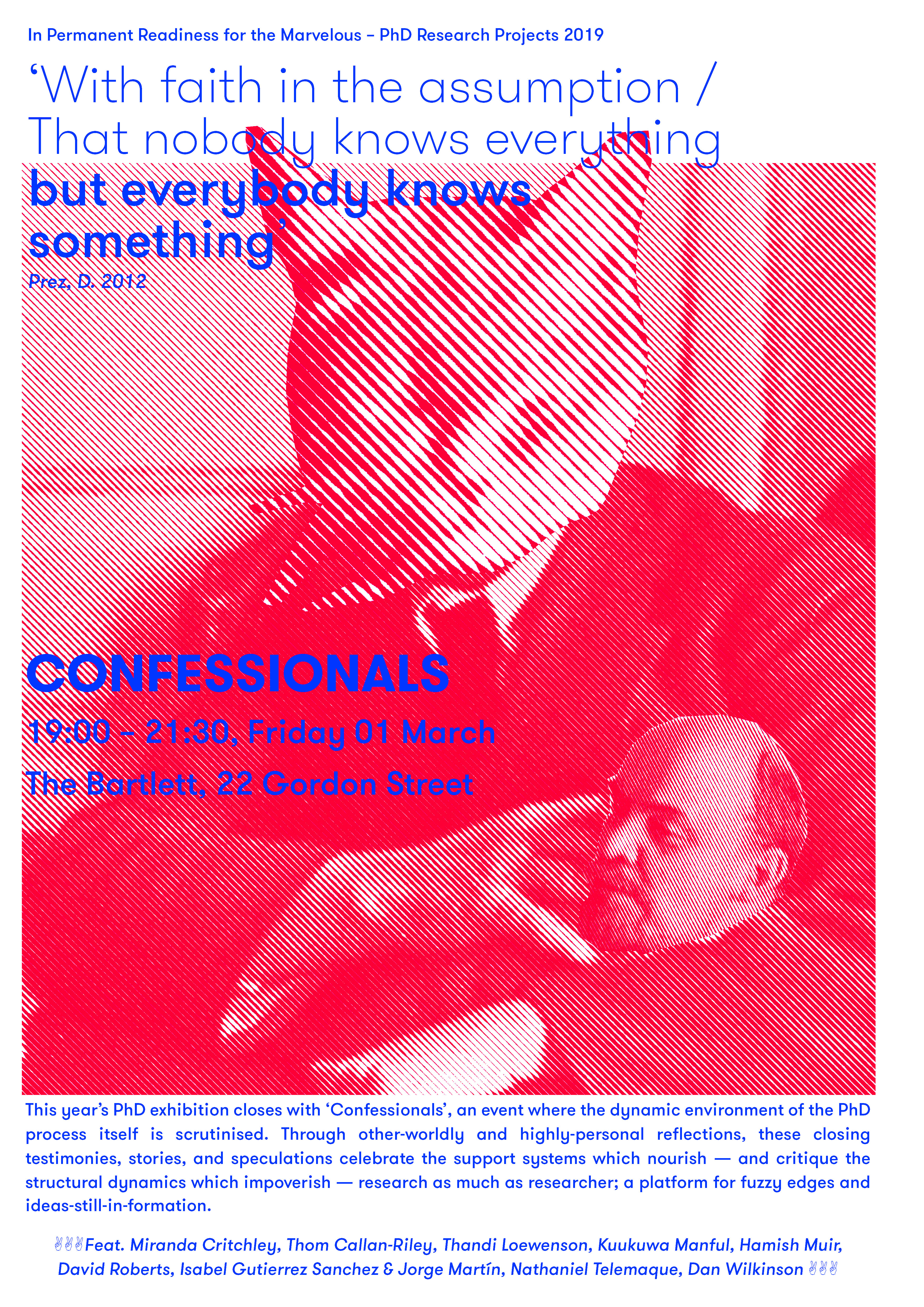Performance
01 March 2019
The Bartlett School of Architecture
22 Gordon Street
WC1H 0QB
‘Each one teach one—we got to pass it on / Keep doing the knowledge, building and adding on / With faith in the assumption / That nobody knows everything but everybody knows something
– Dead Prez, Learning Growing Changing, 2012
Each year, researchers from the Bartlett’s PhD programme present their work at a one day conference and in an exhibition on the ground floor of the Bartlett School of Architecture, 22 Gordon Street, open to the public for two weeks. In 2019, in a student-led initiative, the Bartlett ‘PhD Research Projects’ conference aimed to expand this programme and test the boundaries of what an ‘exhibition’, ‘conference’ or even the presentation of a ‘PhD’ should look like.
We were interested in the fuzzy edges—the ideas-still-in-formation of the PhD research process, the connections we see and the ones we don’t, pulling and shifting. A form of ‘spooky action at a distance’, drawing on Questlove’s reimagining of Albert Einstein’s quantum theories: “Einstein was talking about physics, of course, but to me, he’s talking about something closer to home – the way that other people affect you, the way that your life is entangled in theirs whether or not there’s a clear line of connection.”
We wanted to discuss the support systems which nourish – and the structural dynamics which impoverish – the research process. We believe the PhD is as much about finding the right playlists and referencing hacks, participants and data sets, WhatsApp groups and Google Docs – as research methodologies and navigating ethics in the field. We invited contributors to use the exhibition space to test out a methodology, to share a skill they had honed, to voice a working idea, or the dilemmas and experiences of PhD research.
BREAK // LINE
David Roberts intro
Brothers and sisters.
Holy fuck PhDs are beautiful. Look at the marvelous (one l) beauty and complexity of these works of drawing, making, writing and performing around us, ‘nourishing an impatient strength within us’, in the words of our spirit guide Suzanne Césaire. We gather here today to celebrate the final day of this exhibition.
But holy fuck PhDs are painful. Emotionally, intellectually and politically demanding as they often ‘require us to be critical of what we do and open to change’, in the words of the guiding spirit of my PhD Jane Rendell. We gather here today to bare witness to seven confessionals from those on the path towards and the path through their PhD, to help bear their burden.
It is a generous and precious thing to create a space for mutual support, care and solidarity here. So brothers and sisters I seek to recruit you. I ask some things of you this evening. The first is to thank the exceptional duo behind this, can you please join me in wild applause for Thandi Loewenson and Thom Callan-Riley.
I can do no better than describe tonight in Thandi and Thom’s words: ‘Through other-worldly and highly-personal reflections, these closing testimonies, stories, and speculations celebrate the support systems which nourish, and critique the structural dynamics which impoverish, research as much as researcher; we offer a platform for fuzzy edges and ideas-still-in-formation.’
Wonderful! Let’s take this one by one to introduce the ideas and format of this evening.
The other-worldly and highly-personal reflections will be delivered by seven confessors peppered throughout this evening, who, upon a gong, will not interrupt but enhance your drinking when they rise on this soap box in this halo and present, perform or preach for five minutes.
Their testimonies, stories, and speculations speak of aspects of the PhD process before, during and at its conclusion rarely addressed in public fora.
The structural dynamics they critique are ones we cannot lose sight of. Sexism, racism, classism, colonialism, heterosexism, and ableism hold down and hold back voices, approaches and some PhDs from even beginning, reinforcing and reproducing social divides as Rosalba Icaza and Rolando Vásquez put it.
Facing this are the support systems that nourish. This is where we all come in. There is no booth, no priest, and no guilt in tonight’s confessionals. Our confessors do not seek absolution, but understanding, support, solidarity. It is not up to them to change, but for institutions like this and for us to change.
Which brings me to the final clause, on fuzzy edges and ideas-still-in-formation. These are the things that get tightened up and ironed out over a PhD. But maybe they shouldn’t. They speak of difference. Of the diversity of experiences. Maybe these are more important than the subject.
So when I read of fuzzy edges, I thought of the confessional of the quilting artist Yvonne Wells which opens Elsa Barkley Brown’s seminal essay ‘What has happened here?’ addressing the politics of difference in women’s history and feminism. It’s a confessional that offers no apology for a different approach, but makes space for understanding difference, and asks others to see differently. I end with Yvonne Well’s words:
‘My work is not traditional. I like it that way. If people tell me to turn my ends under, I'll leave them raggedy. If they tell me to make my stitches small and tight, I'll leave them loose. Sometimes you can trip over my stitches they're so big. You can always recognize the traditional quilters who come by and see my quilts. They sort of cringe. They fold their hands in front of them as if to protect themselves from the cold. When they come up to my work they think to themselves, “God, what has happened here-all these big crooked stitches.” I appreciate these quilters. I admire their craft. But that’s not my kind of work. I would like them to appreciate what I'm doing. They are quilters. But I am an artist. And I tell stories.’



